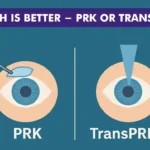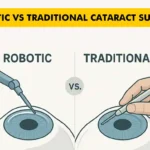Diabetic retinopathy is a severe condition that occurs when the blood vessels in the back of the eyes (retina) are damaged. This condition is a complication of diabetes and can develop when patients do not manage diabetes correctly. It’s essential to keep in mind that diabetic retinopathy is associated with both Type 1 and Type 2 diabetes.
Diabetic retinopathy symptoms
One of the factors that make diabetic retinopathy rather dangerous is that it is hard to detect during the early stages of its development. In fact, you may not even realize you have this disease, as there are no discernible symptoms at the beginning. However, as the disease progresses, you may notice the following diabetic retinopathy symptoms:
- Blurred vision
- Dark spots
- Impaired ability to see colors
- Blind spots or empty areas in your field of sight
- Fluctuating vision
- Vision loss
The impairment in vision can occur in one or both your eyes. So, as soon as you experience any vision changes, you should immediately visit an ophthalmologist.
Who is at risk for developing diabetic retinopathy?
As diabetic retinopathy is a complication of diabetes, patients who do not adequately monitor their blood sugar levels are considered to be most at risk for developing this disease. Moreover, there are a few other factors that can increase the risk of developing diabetic retinopathy, such as:
- High blood pressure
- Tobacco use
- Pregnancy
- High cholesterol
- Duration of diabetes (if you’ve had diabetes for a long time, you’re more likely to develop diabetic retinopathy)
Diabetic Retinopathy Treatment
The treatment of diabetic retinopathy depends entirely on how far the disease has progressed. You can expect your eye doctor to recommend any of the following:
Early diabetic retinopathy treatment
Doctors do not recommend a specific treatment course for patients who have early diabetic retinopathy (or retinopathy that has not spread vastly). Generally, the recommended course of action is to monitor the retina regularly and control your blood sugar levels.
Advanced diabetic retinopathy treatments
There are four main courses of treatment that doctors generally recommend based on how far the disease has progressed:
- Photocoagulation:
Also known as focal laser treatment, it involves using lasers to prevent fluid or blood from leaking from damaged vessels
- Panretinal Photocoagulation:
This is called a scatter laser treatment and is used to shrink abnormal vessels in the eyes, along with treating areas of the retina to prevent further problems.
- Vitrectomy:
This procedure involves Vitreoretinal surgery in the eye to remove blood from the vitreous humor (fluid) along with any damaged tissue that might be harming the retina.
- Vascular Endothelial Growth Inhibitors (VEGF):
This procedure involves injecting medicines known as VEGF into the eye. This prevents the growth of new blood vessels and can slow down the progression of diabetic retinopathy.
Final Thoughts
Diabetic retinopathy is entirely preventable. If you have diabetes, you must follow a low-sugar and low-carb diet and indulge in light exercises daily to ensure that complications related to diabetes (such as diabetic retinopathy) do not occur. If you experience any changes in your vision, get in touch at the earliest.
Why visit Centre for Sight?
With 45 centres pan-India and over 150 doctors, we are the right place to turn to for any of your eye-care needs. Our advanced diagnostic tools ensure quick and efficient diagnosis so that no time is wasted before starting your treatment. Our retinal surgery unit is renowned as one of the best in India, as we use state-of-the-art technology to ensure that the proper treatment is administered. This is why so many of our patients walk away with positive outcomes!
Article: Diabetic Retinopathy: Treatment, Symptoms & Risk Factors.
Author: CFS Editorial Team | Mar 19 2021 | UPDATED05:00 IST
*The views expressed here are solely those of the author in his private capacity and do not in any way represent the views of Centre for Sight.





